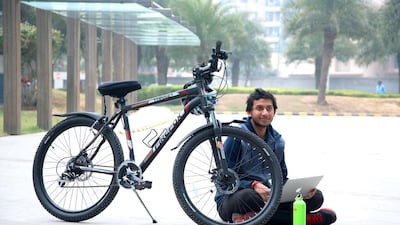At just 22, Ritesh Agarwal is the man behind India’s largest branded network of hotels.
But while he might be one of the country's most successful young entrepreneurs, his mother still regularly tries to persuade the college dropout to consider going back to get a degree.
“I go home once a year and every time at the breakfast table, she says, ‘If you don’t have a degree on your bio-data, would anyone marry you?’”
Returning to higher education is unlikely though, as the chief executive is far too busy with his rapidly expanding budget hotel company, OYO Rooms.
Based in Gurgaon, a satellite city of Delhi, and a bit more than two-and-a-half years after its launch, OYO now has about 5,000 hotels as part of its network in 175 cities across India. In August, it secured an investment of US$100 million from the Japanese telecom and internet giant SoftBank.
The aim now is to expand OYO to include 25,000 to 30,000 hotels in India by the end of this year. With a population of more than 1.2 billion and Indians increasingly travelling within the country amid rising incomes and the rise of budget air travel, there is huge potential.
The company is also looking to go global, with Dubai a top priority. “The question is when, because we have significant ambitions for India that we are working hard towards,” says Mr Agarwal. “Most specifically, the Middle East presents an extremely exciting opportunity because a lot of Indians travel there and reside there.”
Mr Agarwal’s entrepreneurial journey started in 2011 when he founded Oravel Stays, an online platform for listing and booking accommodation. Then in May 2013, he transformed it into a marketplace for standardised budget hotels by launching OYO Rooms, under which existing lodgings have to meet specific brand standards to be part of the chain. The company is tech-driven, with an app available that allows guests to book hotels and order drinks to their room.
“I never thought that this would become something this large, with the ambition of making it larger than we have today,” says Mr Agarwal. Originally from the small town of Bissam Cuttack in the state of Odisha in the east of India, his parents are conservative and did not discover their son had dropped out of college until they came across articles about him in the media.
Mr Agarwal came up with the idea of starting a branded budget hotel chain because of “painful” experiences travelling around India as a child and staying with relatives, and then later in life staying in guesthouses and bed and breakfasts in the country. “I think that was the time when I felt there’s a huge problem of predictability in the accommodation experience in India,” he says.
A big break for the entrepreneur came when he was selected for a Thiel fellowship in 2013, a two-year programme set up by the PayPal founder, Peter Thiel, which included mentorship and a $100,000 grant to launch his business. The fellowship taught him to “think really big” and that “emulating something is not so cool”, he says.
When it comes to expansion to Dubai, OYO has existing connections in the emirate. And, with a team already in place working on understanding the market, Mr Agarwal believes the chain will enter Dubai this year or next. “A lot of our hotel owners in India also have hotels in Dubai, and a lot of other hotel operators who live there have hotels here in India that we operate and partner with,” he says. “There is also a clear similar problem in the sub-$30 or $40 range – there’s no clean, comfortable, affordable, technology-savvy hotel chain out there.”
But would the company really be able to offer such cheap rooms in Dubai?
“Similar questions arose in India when we were starting out,” explains Mr Agarwal, who says one of his biggest challenges was persuading hotel owners to join OYO. “In Gurgaon there was not a single hotel available in the budget segment below $70 to $80, and today we consistently operate at $25 to $30 and a bunch of cities are already profitable for us.
“In Mumbai, you would not get many budget hotels below $100 a night and we sell at $50 a night on average. We understand how to use occupancy and the load rates to become 80 to 90 per cent and very strongly decrease the average prices per night.”
Mr Agarwal attributes his success to being “passionate about the mission of actually solving the problem for myself”, whereas “almost everyone else was doing it as a form of creating a business where they would try to solve it for others”.
However, success is not always a smooth ride – he has received death threats from competitors, something he takes in his stride.
“It’s not that scary,” he says.
business@thenational.ae
Follow The National's Business section on Twitter

